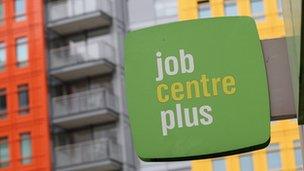In and out of the job search
- Published

Unemployment has come down, but so has the rate of employment
It matters that the number of Scots seeking work is falling, not least to those people at the margins of the job market.
It probably matters politically, though you can't be sure which party of government benefits most when Scotland returns to having a lower unemployment rate than the UK as a whole.
But it also matters that the number of people in employment has fallen substantially - down by 27,000 in August to October - because it suggests a substantial number of people at the margins of the labour market have opted out of it.
The Scottish figures tell us that 1.578m Scots of working age were not in the labour market during last summer. That's up 11,000 on the year before, and more than 50,000 up on four years before.
The economic inactivity rate - neither in work nor looking at it - has been creeping up through the downturn, to 37%. The women's rate has been rising slightly faster, most recently nearing 44%.
Active and inactive
Not everyone has the luxury of choosing, and have to stick with the job search. Some are students, for whom the job search is optional, but not always worth the bother. For them, the consequence of having no job will simply be yet more debt when they graduate.
Of 777,000 Scots aged between 17 and 64 deemed economically active in the year to June, 176,000 were students. That's up 10,500 on the previous year, and 16,000 up on four years before.
Of the other categories, 155,000 were looking after family or the home, and 243,000 were counted as sick, either short or long-term.
Some 142,000 were retired before turning 65.
And of those 177,000 people, some 188,000 would like to have jobs.
What, then, of those who are termed 'discouraged'? The Scottish numbers from this ONS sample are too low to register reliably. But the UK figures suggest 64,000 people say they've been primarily discouraged into not searching for work - a number that's been falling recently.
There have been sharper falls over the past year in the number of people retiring before 65 or counted as long-term sick.
Private and public
To return to the numbers of people in work, the 27,000 fall in Scotland runs counter to the 40,000 rise for the UK as a whole.
Why? The figures don't tell us. But it almost certainly has to do with the capacity of the private sector to make up for the loss of jobs in the public sector as the cuts bite.
Across the UK, private firms have been creating jobs at roughly twice the rate the public sector's been losing them. But as the latest figures show nearly 12,000 public sector jobs lost in Scotland between the third quarter of last year and July to September this year.
These numbers are collected by different means and they're far from a perfect fit. But they suggest that recruitment growth in Scottish private firms is not doing nearly as well as south of the border.
Second jobs
Another perspective on the picture for Scotland shows there are more than 100,000 people with second jobs. You might think that's because they can't find full-time employment and have to combine roles.
But the number earning from second jobs has been consistent over the past four years of the downturn.
You might also reach for the stereotype of women with several cleaning jobs.
Think again: 46% of those with second jobs are male.
You can also comment or follow Douglas Fraser on Twitter: @BBCDouglsFraser